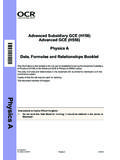Transcription of 9693 Marine Science AS teacher support
1 9693 AS Marine Science teacher support University of Cambridge International Examinations 2010 9693 AS Marine Science teacher support UCLES 2010 2 Contents Introduction 3 1 Scientific method 4 2 Marine ecosystems and biodiversity 5 3 Energetics of Marine ecosystems 10 4 Nutrient cycles in Marine ecosystems 13 5 Coral reefs and lagoons 16 6 The ocean floor and the coast 19 7 Physical and chemical oceanography 24 9693 AS Marine Science teacher support UCLES 2010 3 Introduction The GCE advanced subsidiary Level and advanced Level in Marine Science syllabus includes a scientific study of the sea and its ecosystems and how human activities have an impact on the Marine environment.
2 This booklet has been written specifically to assist teachers in the interpretation and application of the syllabus, with references to both the theory and practical content. It is expected that practical work will underpin and illustrate the theory content of the whole syllabus and will include both laboratory-based activities and field trips. The syllabus, together with sample assessment materials, mark schemes and other resources can be found on the Cambridge International Examinations website to which reference should be made.
3 The aims of this booklet are to provide: guidance on the teaching of the theory content by including definitions of terms used in the syllabus and a fuller explanation of the learning outcomes. suggestions for practical activities and outline methods for the more complex activities. references to sources of further information, including web based and reference books. Each of the subject content sections of the syllabus includes a number of learning outcomes. In this booklet, each learning outcome, (a), (b), (c), etc.
4 , is followed by an explanatory note to amplify the learning outcome. For further information and details of each learning outcome, please refer to the resources listed at the end of each syllabus section. 9693 AS Marine Science teacher support UCLES 2010 4 1 Scientific method The relationship between hypothesis, experiment and theory in Science . Uncertainty in experimental results. It is expected that most of the learning outcomes in this syllabus section will be achieved by candidates carrying out practical activities.
5 It should be noted that although there is no separate assessment of practical work, candidates may be asked about practical activities in any of the examination papers. Candidates should therefore be able to design experiments, with references to the control of variables and collection of quantitative data; interpret experimental data to determine whether or not they support or refute the hypothesis; formulate a hypothesis on the basis of experimental data and explain how inherent variations and limitations in the measurement of experimental data lead to uncertainly in the results.
6 (a) Describe how scientific method involves interplay between observations and the formation, testing and evaluation of hypotheses. The principle of scientific method is based on the collection of data by observation and experimentation and the formulation of hypotheses. The hypotheses may be subsequently refined on the basis of the observations. Scientific research involves proposing hypotheses to explain observed phenomena, then designing and carrying out experiments to test the hypotheses.
7 (b) Design experiments to test a given hypothesis, in which variables are controlled and quantitative results are collected. Candidates should be able to apply their knowledge of practical techniques to design experiments. As an example, to design an experiment to test the hypothesis that the rate of photosynthesis of an aquatic plant increases as light intensity increases. In this example, it is important to recognise that light intensity is the key variable and others, including temperature and the wavelength of light are the control variables.
8 The effect of control variables should be eliminated by careful experimental design if valid results are to be obtained. The nature of the results obtained depends on the actual investigation, but could include measurements of volume, time, length, mass or temperature, with appropriate SI units. If a rate is measured, this should be expressed in relation to time. (c) Interpret experimental data to determine whether they support or refute the hypothesis being tested.
9 Candidates should be able to recognise trends in data presented in the forms of tables or in graphical form. For example, they should be able to recognise whether or not there is a relationship between two variables and to comment on this in the context of a stated hypothesis. Candidates will not be expected to use a statistical test to support a hypothesis. (d) Formulate a hypothesis on the basis of experimental data. With reference to experimental data, candidates should be able to state an operational hypothesis.
10 For example, a table of data might suggest that, as the concentration of nitrate ions increases, the growth of algae also increases. From the data, candidates could suggest the hypothesis that there is a positive relationship between the concentration of nitrate ions and the growth of algae . (e) Explain how inherent variations and limitations in the measurement of experimental data lead to uncertainty in the results. Candidates should recognise the relationship between variability of experimental data and the validity of any conclusions drawn.


